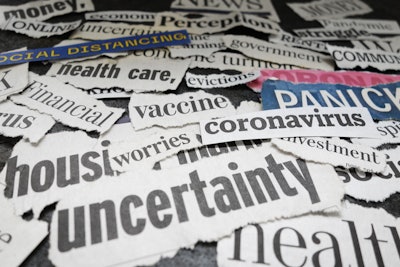
Despite ongoing health and safety concerns, record inflation, and a barrage of divisive current events, the show must go on. But it can be challenging for event professionals to know the right way to promote their gatherings without acknowledging the difficulties their attendees may be facing in their personal and professional lives.
“Maintaining a keen awareness of what mindset your target attendees may be in when they open your invite email, land on your registration page, or show up to your event has never been more critical for event marketers’ success," notes Camille White-Stern, head of experiential marketing for event marketing platform Splash.
Her solution? "Meet your attendees where they are psychologically in order to get them to take the desired action you want them to take, whether it’s registering for your event, actively participating in your event, or engaging with your brand post-event.”
So, how exactly do you do that? Read on for five key tips from White-Stern and other experienced event marketers.
1. Lead with empathy, and acknowledge the challenges your audience is facing.
Taking an "empathetic approach" is key, notes Jeff Snyder, CEO of experiential agency Inspira Marketing. "We start by gathering data on how the consumer feels, and then look at research around the category," he says. "We layer this with the brand goals and create an integrated, scalable strategy.”
White-Stern advises imagining yourself in your attendees' shoes in order to properly consider their perspectives. "What needs are they looking to have met? What problems are they trying to solve? Thinking through their needs and expectations leading up to and during the event will help you design and deliver human-centric experiences that offer real value to attendees," she says.
To avoid being tone deaf, she adds, lean into authenticity, and don't be afraid to acknowledge the challenges and current climate facing your target industry. "Not all industries will be impacted in the same way—so keep that in mind as you’re crafting your pre-, during, and post-event communications and touchpoints," she says.
"One way we’ve approached this at Splash is by including a custom question in our event registration forms that asks attendees to share what challenges or questions are top of mind for them," White-Stern continues. "Not only does this help me stay tapped into what matters most to attendees, but it also helps me tailor the content and experience of the event to ensure a positive return on emotion or attendee sentiment—which is a newer event metric we’re tracking to help us measure event success.”
2. Focus on the value your event offers.
“We live in an increasingly noisy world," points out Rodney Hart, vice president of events at marketing platform RainFocus. "As an event organizer, the temptation to cut through the noise may be to promote loudly and frequently. But the intent of that will have the opposite effect."
The best way to navigate today's landscape, Hart adds, is to focus on promoting the specific value your event can offer.
White-Stern agrees. “What we’re seeing is that people are more selective with their time and more discerning about which events they choose to attend. It’s OK to acknowledge this behavioral shift in your event marketing and communications," she says. "The solution is to make it clear that you know how valuable their time is, and focus on why your event is a worthwhile spend of their time."
She suggests doing this through the event registration page, confirmation messaging, pre-event reminder emails, and post-event emails. "At the end of the day, despite all the headwinds facing event marketers today, attendees are still in search of and receptive to content and experiences that meet their needs, teach them something new, empower them to overcome a hurdle, and/or offer them a community," White-Stern says. Photo: Shutterstock
Photo: Shutterstock
3. Pay attention to the news, and adjust your promotions and timing accordingly.
Stay flexible, and be prepared to adjust your marketing plan based on current events. After all, no one wants to be the one sending out pre-scheduled social media posts when the conversation is dominated by a current crisis. Hart adds, “It’s important to keep tabs on the current climate and news to adjust messaging or the timing of your communications, when needed.”
Madison Breuer, an event planner and PR account director for Serendipit Consulting, thinks that it's vital for brands to avoid being tone deaf to the frequency of hot-button issues that are popping up these days.
When a crisis happens that may affect your event marketing, Breuer recommends asking yourself some key questions: "Do we acknowledge it happened? Do we go dark? Ask your client if they want to speak to this if it is relevant, and consider what you are posting to market the event and when," she advises. "Stay on top of the news, and go dark on certain days." And when appropriate, consider finding ways to use the event to acknowledge the situation through fund-raising or other give-back methods.
Ultimately, the answer to these questions depends on what feels appropriate for the event and brand. "Overall if brands want to stand out and be seen as authentic, they must be true to their core values and mission. Because it is all about authenticity and communication."
4. Avoid communicating too frequently—but don’t neglect crucial information.
Hart advises being strategic with how often you communicate with your potential attendees. “If you think about a large, in-person event, it typically includes driving registration well ahead of having your full content catalog and event offerings in place," he notes. "Resist the urge to communicate the same details too frequently to avoid losing the attention of your audience when it comes time to communicate the full value of your event."
He recommends utilizing an event marketing platform, which will allow you to capture data on attendees to see where their interests are and leverage that for future events.
But don't forget to share crucial information—which right now, may mean information on health and safety measures, even if local regulations no longer require it. “When it comes to specific issues such as COVID and monkeypox, consumer perception remains diverse," points out Ralph Failla, senior account director for Inspira Marketing. "Whether required or not, we develop activation guides and practices that ensure safety of staff and attendees, including sanitizing stations and attention called out to ‘high-touch’ areas, to ensure consumers feel comfortable participating at an event."
5. Focus on offering moments of escapism and joy.
Feyisola Ogunfemi, the owner of Statuesque Events who also runs a coaching and mentoring program called Planners Who Profit, believes there are two types of event attendees right now.
"While there are many people who want to stay home in the midst of everything going on, we are also seeing record numbers of people traveling, going to festivals, and otherwise gathering in large numbers," she says. "The pent-up demand from two-plus years at home is still here, and people are looking for events to attend and ways to connect with others. Many others are looking for fun and an escape from the daily news cycle of doom and gloom—so it's important that we don't shy away from providing this for people."



















